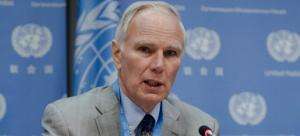UK austerity is 'inflicting misery', says UN expert

A top United Nations official has delivered a scathing assessment of the UK Government’s austerity programme, saying it is inflicting “misery” on vulnerable people and "dismantling" the country's social safety net.
Professor Philip Alston, United Nations Special Rapporteur on extreme poverty and human rights, made the comments in a report outlining his findings from a two week fact finding visit to the UK where he spoke to people in poverty, frontline workers, food bank staff and politicians.
He hit out at the “systemic dismantling” of social protection policies since 2010 and expressed alarm that despite the UK being the world’s fifth largest economy 14 million people – a fifth of the population – live in poverty.
Austerity, and damaging policies like Universal Credit, have almost always been ‘sold’ by the government as economically necessary but have actually been “a political choice” driven by a desire for “social re-engineering”, he said. Ministers were in "denial" about the harm caused, he added.
Prof Alston said: “Austerity could easily have spared the poor, if the political will had existed to do so. Resources were available to the Treasury at the last budget that could have transformed the situation of millions of people living in poverty, but the political choice was made to fund tax cuts for the wealthy instead.”
Citing statistics from the Institute for Fiscal Studies predicting a seven per cent rise in child poverty between 2015 and 2022, Prof Alston said the child poverty rate in Britain was “a disgrace” and “an economic disaster”. He criticised the “gutting” of local authorities and said the cuts made to social support and preventative services had left people reliant on “charities and crisis services”, including foodbanks.
“The costs of austerity have fallen disproportionately upon the poor, women, racial and ethnic minorities, children, single parents, and people with disabilities,” he warned.
Prof Alston said the devolved administrations in Scotland, Wales and Northern Ireland had tried their best to “mitigate the worst impacts of austerity” despite having core funding cut by Westminster. But he warned the mitigation “comes at a price and is not sustainable”.
Ex-BASW chair Guy Shennan, who is part of the Boot Out Austerity campaign run by social workers and user groups, said the UN findings added to a “long list of damning evidence” of the impact of austerity in the UK.
“Anyone who takes the trouble to properly look, as Professor Alston has done in his two weeks here, will see how the savage cuts of the last eight years have exerted a heavy toll on the most vulnerable members of our society,” he said.
“Social workers see this every day, and this is why when I was chair of BASW we made campaigning on this a key priority. It is part of every social worker’s role to work towards social justice in partnership with the people we serve, as is clear in our Code of Ethics and the international definition of social work."
Shennan added: “Austerity is not over when a surprise windfall can be given as tax cuts to the rich rather than meet the needs of our poorest citizens. Our campaigning is therefore not over either and our efforts need to be redoubled.”
Colin Reid, chair of BASW Northern Ireland, said the UK's level of destitution and child poverty was "nothing short of a national outrage". He accused the Westminster government of adopting "a dogged and unflinching approach to pursuing auterity at all costs".
"It is essential that Government recognises the impacts of austerity on all areas of public services. While huge sums have been extracted from the benefits system, including those associated with the deeply flawed Universal Credit system, savings are minimised by the associated growth in demand for public services, not least of all, social work," he said.
"Increasingly, our members bear the pressure of delivering under-resourced services which creak beneath the strain of ever-growing poverty-related social problems."
The government said it “completely disagreed” with the UN analysis. A spokesperson said household incomes were at a record high, income inequality had fallen and universal credit – a policy severely criticised by Prof Alston - was helping more people into work.
“We are absolutely committed to helping people improve their lives while providing the right support for those who need it,” the spokesperson added.
Margaret Greenwood, the shadow work and pensions secretary, said: “The government should listen to the people being pushed into poverty by its policies.
“Universal credit is failing miserably, leaving families in debt, [in] rent arrears and at risk of becoming homeless. Three million children are growing up in poverty despite living in a working household."
